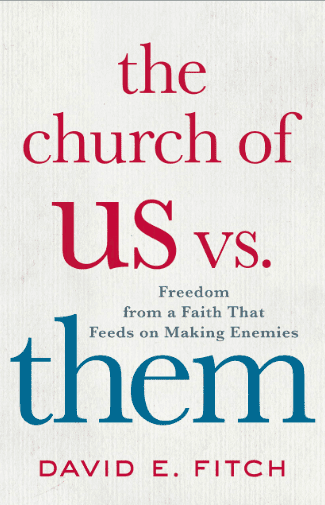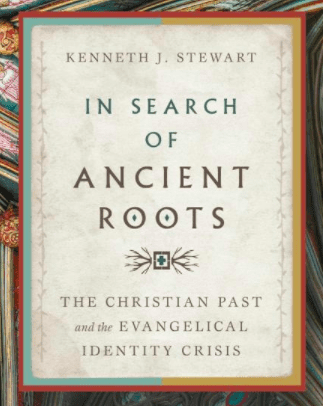 The post today will wrap up our discussion of The Anointed: Evangelical Truth in a Secular Age by Randall Stephens and Karl Giberson. In this book Stephens and Giberson examine several different facets of American evangelicalism to explore the manner in which “America’s populist ideals, anti-intellectualism, and religious free market, along with the concept of anointing – being chosen by God to speak for him like the biblical prophets” influence a broad range of evangelical and fundamentalist beliefs and practices.
The post today will wrap up our discussion of The Anointed: Evangelical Truth in a Secular Age by Randall Stephens and Karl Giberson. In this book Stephens and Giberson examine several different facets of American evangelicalism to explore the manner in which “America’s populist ideals, anti-intellectualism, and religious free market, along with the concept of anointing – being chosen by God to speak for him like the biblical prophets” influence a broad range of evangelical and fundamentalist beliefs and practices.
The theme that ties the book together is an analysis of the informal criteria generally used to “anoint” leaders within evangelicalism. Chapter six, Made in America, focuses explicitly on this topic. Stephens and Giberson open the chapter with a discussion of three leaders – Jerry Falwell, Oral Roberts, and Pat Robertson – and use this, along with a consideration of the individuals described in the earlier chapters as a starting point to look at the way in which leaders emerge within American evangelicalism and fundamentalism.
Throughout the post-1960’s era Falwell, Roberts, and Robertson were public symbols of the capacity of the parallel culture of American evangelicalism to anoint leaders using criteria internal to that culture – fidelity to the Bible, inspirational preaching, confident assertion of a special relationship to God.
…
The parallel culture of evangelicalism is like a country without monarchs or politicians. It must produce its own leaders, which it does, through informal processes. These leaders, both great and small, build constituencies more or less skilfully, but they generally employ similar strategies – finding themes around which to rally their followers, playing on common fears, identifying out-groups to demonize, and projecting confidence. (p. 232-233)
What does it take to become a successful leader within evangelicalism?
Which of these characteristics should we value in our leaders?
Which are problems that damage the church?
At times the discussion by Stephens and Giberson seems overly cynical – but there are important ideas here that need to be considered carefully. The question of “anointed leadership” is central to their discussion and in this chapter this concept is defined most clearly.
The anointing phenomenon is deeply rooted in good old-fashioned American anti-intellectualism. It is supported by some specifically evangelical characteristics. And it is completed with the charisma and ingenuity of the individual leader. The phenomenon exploits these energies, combining them synergistically to make the whole more than the sum of its parts. (p. 234)
Experienced and trained scholars and thinkers who write with care and with nuance cannot make much of an impact against the charismatic emphasis on common fears and “common sense” readings that appeal to broad crowds. The basic features of charismatic leadership are not, by any means, unique to American evangelicals. But without institutional structure, with an approach that assumes anything worth knowing or necessary for understanding should be obvious to all without much work or study, and with the comfort of belonging to a group, American evangelicalism is a fertile field for this form of leadership – both for better and for worse.
There are several important characteristics that feed into the way we look to, listen to, and evaluate both Christian and secular leaders.
We look for someone like us. Stephens and Giberson point out the importance of identification. One particularly interesting example here is the push-back in some quarters against childhood immunization. This is not an evangelical issue – it is a much broader societal issue. A study led by Dan Kahan of Yale University Law School found that this cultural identification is often the deciding factor.
We seek various “cultural clues” that connect us to the expert as a shortcut for determining veracity. Someone just like us is more likely to tell us the truth, we intuit, than is a famous egghead from a far-off university with whom we have nothing in common.
“To figure out what sorts of factual information we can reasonably rely on,” Kahan explains, “we nake use of all manner of cultural cues, many of which relate to the authority and trustworthiness of others, including people who hold themselves forth as experts.” If the mantle of “expertise” is flexible enough that anyone can wear it, then authority can be had by simply making the right connections with one’s audience. (p. 244-245)
Like all of the factors that come into play when looking for clues the trustworthiness of an authority or one who claims authority, these cultural clues are part of human nature. They are not wrong, but they are best used with an element of critical thinking. I posted a while back on some ways to evaluate: Who Can We Trust?
To what extent should in-group identification play a role when evaluating authorities?
The presence of a common enemy. Modern evangelicalism, and, for that matter, much of human civilization both secular and religious, is formed by the threat of common enemies. We have built within us the natural tendency for in-group identification and defense against the out-group. Although I disagreed to an extent with the way Stephens and Giberson portrayed James Dobson, it is certainly true that Ham, Barton, Dobson, Lindsey, LaHaye, and most other well known evangelical or fundamentalist leaders are characterized most significantly by what or who they stand against. Ken Ham’s entire approach is dominated by military rhetoric and culture war conflict mentality. This isn’t only an issue on the fringe however. James Dobson focused on the family because of the range of forces he saw standing against the Christian family. Harold Ockenga wrote in 1947 “Darkness has engulfed our age.” …”Sin, fear, hate, doubt, distrust, and despair characterize the dominant mood of this age.” (p. 255) We are, it seems, in the midst of a battle between the small faithful remnant and the forces of secularism, liberalism, and Satan.
The discussion of the relationship of science and the Christian faith is laced through and through with culture war rhetoric. I fully realize that this isn’t a failing of evangelicals and fundamentalists alone. It is equally apparent in the rhetoric of Dawkins, Dennett and Harris, to name but a few. But I am much more concerned with the effect it has within the church, than on the battles fought outside. The culture of fear causes Christians to turn on fellow Christians in the desire to remain among the faithful. We eat our young, our middle aged, and sometimes our elders. (One recent example here. I could point to many more.)
How are we to know when the threat is real?
When is it more accurate to say, quoting the inestimable Walt Kelly, “We have met the enemy and he is us”?
Calling. Within the Christian subculture calling plays a significant role in the evaluation of authority. Leaders are called by God to stand for truth and for the gospel. Most leaders feel themselves called to this role within the church – and this sense of calling ranges from pastors and teachers to college administrators, seminary presidents, and evangelists. Those with a sense of calling include leaders of parachurch organizations from Answers in Genesis to World Vision.
Raised with in this culture, I would certainly refer to my desire to write and interact with the questions of science and Christian faith as a calling. Stephens and Giberson note that this culture of calling is sincere and heartfelt. While “successful Christian leaders wield a constellation of strategies masterfully … Most believe in the authenticity of their mission, as near as can be determined. (p. 266)” In fact, the incidents of proven insincerity and manipulation are few and far between.
We are a called people – but what is the sign that a leader has been ordained and called by God?
How are we to know that he, or she, is faithfully carrying out that calling?
Moving Forward. “Anointed” evangelical leaders rising through an informal accreditation process – a process where rhetoric, charisma, and the ability to persuade count for more than reason or study – have a great deal of influence within the church and within the evangelical subculture. They have an influence, so Stephens and Giberson suggest, that far exceeds that of most local church pastors and of Christian scholars.
The ability of evangelical leaders to combine the persuasive powers of a great preacher with the credibility of an academic generates enormous intellectual authority. As purveyors of ideas, they are thus more powerful than either preachers or academics. In particular, this unique combination makes them much more effective than their more academic evangelical counterparts. (p. 267)
This is not likely to change any time in the near future – nor is it clear that it should change. Stephens and Giberson conclude their book with an ambiguous observation.
The DNA of the parallel culture of evangelicalism is wound from two very different strands – an ancient religious tradition and a secular world increasingly dominated by science and influenced by forces outside of conservative Christianity. … The timeless ancient Book will be forever asked to speak to a constantly changing world, and prophets will of necessity arise to be anointed to make that happen. Those leaders must be skilled in appropriating both the spiritual authority of the Christian tradition and the secular authority of the present culture – whatever its changing epistemological priorities – will provide that intellectual authority and be anointed to lead. (p. 269)
We would benefit if Christians leaders, including preachers and pastors on the front lines, thought hard about the ways that leaders and authorities arise and are validated. We would also benefit if more Christian scholars wrote “for the church” as Scot is wont to say. Perhaps most importantly, we would benefit if more Christian scholars wrote in a way accessible to the average evangelical pastor. Francis Collins’s books The Language of God and The Language of Science and Faith (with Karl Giberson) are great examples, but only a start.
What characteristics should qualify one for leadership?
If you are a pastor or preacher – who do you look to for expert advice?
How do you evaluate evangelical authorities?
If you wish to contact me directly you may do so at rjs4mail[at]att.net.
If interested you can subscribe to a full text feed of my posts at Musings on Science and Theology.











